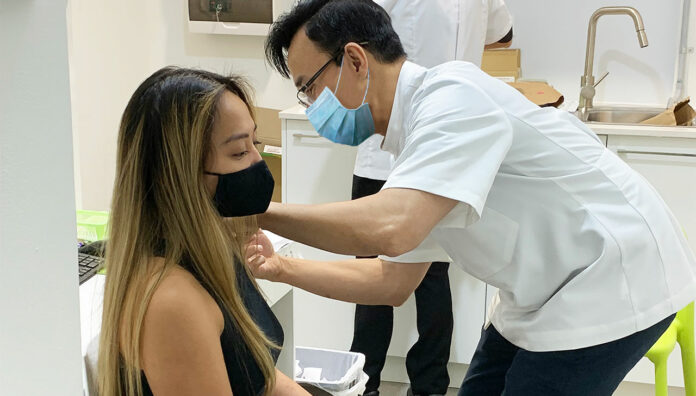Quinn On MPS has been in the news multiple times during the latest Sydney lockdown, sharing his tips to conquer queues, translation and vaccine hesitancy.
Why did you get into pharmacy?
Having enjoyed chemistry at high school it was only natural to study a chemistry-related course. My mother worked as a pharmacy assistant when we first arrived in Australia in 1978. She showed me how rewarding it would be to help people through my work and how it could make a difference in people’s lives.
How did you come to own and operate several pharmacies?
My wife Helen and I bought our first pharmacy in Cabramatta back in 1994. We worked up to 14 hours a day for a few years as it was our dream to provide a healthcare service that not only specialised in dispensing medicines, but aimed to encourage the community to be well informed about the treatment and prevention of illness and diseases.
Our business goal was to ensure patients/consumers understand what medicines they are taking, and why, and understand any adverse effects. In the 1990s and 2000s we worked in a multicultural community where people often worked 7 days a week (and so did we so they could access advice) because they had arrived in the lucky country, and they wanted to make the most of the opportunities. So the community relied heavily on pharmacies to treat common colds, flus and ailments to reduce time off work.
We encouraged consumers to have a long-term goal that involved visiting medical practitioners and a work-life balance. Our first pharmacy was a tiny store, which could not keep up with demand. Over 3 decades we acquired a couple of other pharmacies in the area and trained staff to meet the growing demands of the community. We aimed to empower consumers through various strategies including education on medicines and proper management of chronic conditions such as asthma, blood glucose testing, and blood pressure monitoring. We also advised them on the importance of regular adherence to medication regimens, nutrition and keeping up to date on health-related matters.
How had the pandemic changed your practices up to June this year?
Sneeze screens, mandatory face masks, constant cleaning of surfaces and social distancing has increased the staff work volume, albeit with reduced staff numbers because of the 1.5 square metre per person rule. It also costs to hire staff to stand at pharmacy entrances and exits to ensure QR codes are used and to limit numbers inside.
In Cabramatta business dropped by more than 50% from lack of overseas tourists and consumers visiting from other suburbs. This has been exacerbated by the lockdown and restrictions on movement. We also cannot hold the usual informal staff meetings or social outings – an important aspect of promoting informal learning, morale and satisfaction.
Post the late-June lockdown, how did your pharmacy practice change?
Our business activity fell further but with some patients on repeat medicines we set up a delivery service for them. Staff were kept abreast of the latest developments in the benefits and risks of vaccinations and who should and should not be vaccinated. A proportion of our consumers were unaware of the latest information and the impact of COVID-19, so to counter misinformation, our staff provided accurate and precise facts on the importance of vaccination, not only for individuals, but for their family and the community.
How did you ramp up so quickly?
Ahead of our first 300 doses for our two Cabramatta pharmacies which arrived ahead of our vaccination start on 26 July 2021, I established procedures. Council permitted the erection of a footpath gazebo opposite the pharmacies as an information/waiting/observation area to focus attention on the vaccine rollout. We gave out AstraZeneca information in English, Chinese, Vietnamese, and Cambodian, vaccinated 25 people on the first day in one pharmacy and 20 in the other.
The next day we were inundated and by week’s end both pharmacies had used 660 doses with another 140 the following day. The gazebos made the sites more visible. Word of mouth was powerful, as was the use of Facebook, TikTok, and Instagram by both strangers and customers ‘spruiking’ for us, which attracted daily reporters. We also appeared on all TV channels, the Sydney Morning Herald, Australian Financial Review, local Chinese papers and the New York Times. Once we finessed processes, procedures and workforce, we switched to an online booking system. After 4 weeks we had vaccinated 3,700 people.
Lockdown vaccination top tips
|



 Dr Peter Tenni[/caption]
Dr Peter Tenni[/caption]
 How should we deprescribe gabapentinoids, according to the Maudsley Deprescribing Guidelines[/caption]
How should we deprescribe gabapentinoids, according to the Maudsley Deprescribing Guidelines[/caption]



 Pharmacists have always prescribed, but they have the potential to prescribe much more
Pharmacists have always prescribed, but they have the potential to prescribe much more





